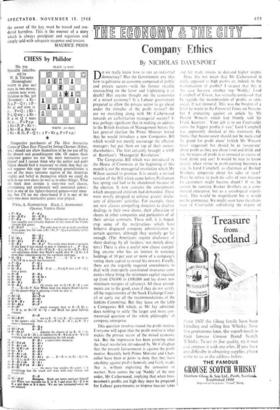The Companies Bill which was introduced in the House of
Commons at the beginning of this month is not the managerial revolution which Mr Wilson seemed to promise. It is merely a revised version of the Bill which came before Parliament last spring and had to be abandoned because of the election. It now contains the amendments which unopposed criticism had demanded. These were mostly designed to enforce greater disclo- sure of directors' activities. For example, there are new clauses compelling directors to disclose dealings in their own shares, their allocation of shares in other companies and particulars of all their service contracts. These will, it is hoped. stop some of the malpractices which have hitherto disgraced company administration in certain quarters, although they scarcely go far enough. (The Americans require disclosure of share dealings by all 'insiders,' not merely direc- tors.) There is also a useful new clause compel- ling anyone who has an interest in nominee holdings of 10 per cent or more of a company's voting share capital to reveal his interest. Finally, there are the urgently required amendments to deal with improperly constituted insurance com- panies (these bring the minimum capital required up from £50,000 to £100,000 and lay down new minimum margins of solvency). All these amend- ments are to the good, even if they do not satisfy all the requirements of the Stock Exchange Coun- cil or carry out all the recommendations of the Jenkins Committee. But they leave on the table a Companies Bill which, as Mr Jay admitted. does nothing to settle 'the larger and more con- troversial question of the whole philosophy' of company enterprise.
This question revolves round the profit motive. Everyone will agree that the profit motive is what makes the private sector of the mixed economy tick. But the impression has been growing since the fiscal revolution introduced by Mr Callaghan that the present Government is against the profit motive. Recently both Prime Minister and Chan- cellor have been at pains to deny that they have anything against profits honestly and fairly made. that is, without exploiting the consumer or worker. Now comes the top `Neddy' of the new order, Mr Catherwood, implying that when busi- nessmen's profits are high they must be prepared for Labour governments to impose heavier taxes
and for trade unions to demand higher wages.
Does this not mean that Mr Catherwood is really opposed to high profits or, indeed, to the maximisation of profits? I suspect that this is the case because another top `Noddy,' Lord Campbell of Eskan, has virtually confessed that he regards the maximisation of profits as anti- social. if not immoral. This was the burden of a letter he wrote to the Financial Times on Novem- ber 8 protesting against an article by Mr Harold Wincott which had bluntly told Sir Frank Kearton : Your job is to see Courtaulds earns the biggest profits it can.' Lord Campbell was apparently shocked at this statement. He thinks that businessmen should not be motivated 'by greed for profit alone' (which Mr Wincott never suggested) but should be as 'temperate' about profit as they are about food and drink and sex. So excess of profit is as immoral as excess of food, drink and sex! It would be nice to know exactly when virtue in profit-earning becomes a %ice. Is Lord Campbell, as chairman of Booker Brothers, temperate about his sales of rum? Does he refuse to push his sales of rum because his customers might become drunk? if so. be cannot be running Booker Brothers as a com- mercial enterprise, but as a sociological experi- ment. This would be magnificent but it would not be commerce. We might soon have the chair- man of Courtaulds subsidising the export of Treasure 1
from
Scotland






























 Previous page
Previous page